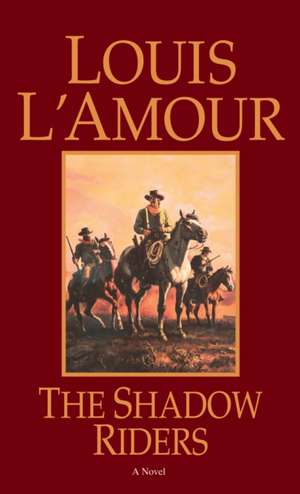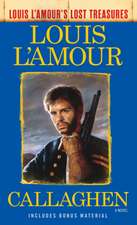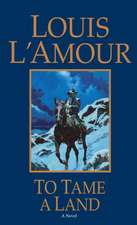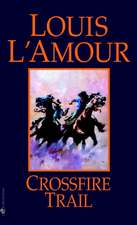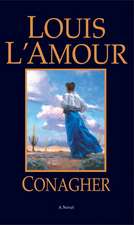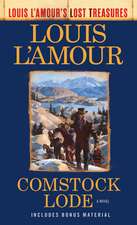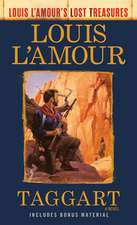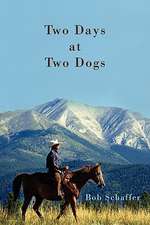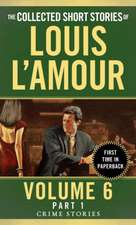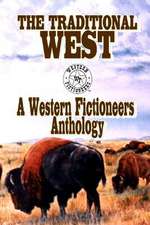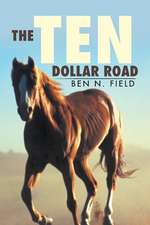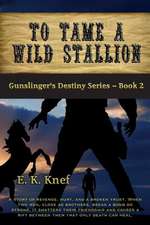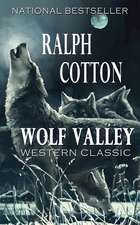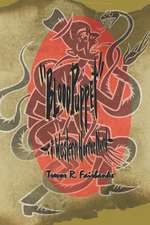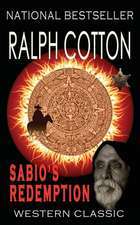The Shadow Riders
Autor Louis L'Amouren Limba Engleză Paperback – 31 aug 1982
Colonel Henry T. Ashford had gathered an army of criminals and renegade soldiers, leading them on a path of destruction and kidnapping through Texas to the Gulf. Among Ashford’s captives were the Travens’ sister and Dal’s tough-minded fiancée, Kate.
Now Mac and Dal must take up arms once again and ride together against Ashford’s army—ready to fight another war, if that’s what it takes to win the freedom of the women they love.
Preț: 38.13 lei
Nou
Puncte Express: 57
Preț estimativ în valută:
7.30€ • 7.61$ • 6.06£
7.30€ • 7.61$ • 6.06£
Carte disponibilă
Livrare economică 27 februarie-13 martie
Preluare comenzi: 021 569.72.76
Specificații
ISBN-13: 9780553231328
ISBN-10: 0553231324
Pagini: 240
Dimensiuni: 107 x 175 x 16 mm
Greutate: 0.11 kg
Ediția:Revised
Editura: Bantam
ISBN-10: 0553231324
Pagini: 240
Dimensiuni: 107 x 175 x 16 mm
Greutate: 0.11 kg
Ediția:Revised
Editura: Bantam
Notă biografică
Louis L’Amour is undoubtedly the bestselling frontier novelist of all time. He is the only author in history to receive both the Presidential Medal of Freedom, and the Congressional Gold Medal in honor of his life's work. He has published ninety novels; twenty-seven short-story collections; two works of nonfiction; a memoir, Education of a Wandering Man; and a volume of poetry, Smoke from This Altar. There are more than 300 million copies of his books in print worldwide.
Extras
Hunching his shoulders against the cold, pelting rain, Major Mac Traven slipped a hand under his caped coat to assure himself his spare pistol remained in position. A sudden gust of wind rattled rain upon his campaign hat and spattered his face and hands.
Desperately tired and carrying the gnawing hunger from three missed meals, he glanced back along the road at the scattered travellers.
They were an army no longer; like himself they were just tired men returning to homes left long ago. Once they had marched with the proud steps of men with a mission to be accomplished; now they plodded wearily, heads down against the rain, thinking only of home.
Under the bare black trees water gathered in pools like mirrors of steel as the rain fell from the sullen sky. Somewhere ahead was a town, if such it could be called, a dismal place by all accounts, but it held the promise of a hot meal and grain for his horse. More he could not expect, yet there might be a letter.
"Watch yourself," he had been warned. "All but the Swede are a pack of thieves. They will steal anything they can put their hands on and murder you if need be."
It was late afternoon when Mac rode into the town's one street, a muddy, rutted alleyway between two rows of nondescript shacks, sodden with rain. Dimly, at the end of the street and through a veil of rain, he glimpsed the river and a steamboat landing.
Here and there a horse was tied to hitching-rails or awning posts. Some of the horses he recognized as those of other soldiers returning from the War.
He turned aside at the log barn that had been described to him and rode around it to the wide open door and the pole corral. He was stepping down from the saddle when a big man with yellow hair appeared in the barn door.
"Olson?"
"Come." The big man motioned him into the barn. "Who told you of me?"
"A steamboat pilot at Helena, on the Mississippi. He said you were the only honest man in town."
The big Swede did not smile. "There is one other," he spoke with only a slight accent. "How long you stay?"
"Over-night."
"Two-bits, then. You can sleep in the hay."
"Isn't there somewhere I can find a bed?"
"A bed with bugs, yes. A bed where you will be robbed. It is no good, those beds."
"I was told there might be mail?"
Mac Traven was as tall as the Swede, although not as heavy. He led his horse to a stall and forked some hay into the manger.
Olson indicated a building. "At the store there is a box. Sometimes there is mail."
"A friend knew I'd be coming this way," Mac said. "It's been four years since I heard from my family." He wiped the rain from his face with a handkerchief. "They live in Texas, and I guess to them I chose the wrong side."
Leaving the stable he walked across the muddy street. Going up the steps he paused to stomp the mud from his boots. Inside the store the air was hot and close. Several men sat or stood around a pot-bellied stove, and a man behind the counter in undershirt and suspenders came over to him. "What's fer y'?"
"Is there any mail for Mac Traven?"
The man behind the counter indicated a box. "If so, it'll be there. You take a look."
A man who had come into the store behind him took the pipe from his mouth. "Traven, did you say? You got any kin in these parts?"
"Not that I know of."
"There's a Johnny Reb down in the shack by the boat landing. Wounded man. They're fixin' to hang him. Kangaroo court."
He had his hand in the mail-box, and now he swiftly withdrew it. He wheeled and ran for the door. Chances are it was somebody else, but—!
Going out the door he heard someone say, "There's a man fixin' to git killed!"
He glimpsed the roof of the shack through the trees near the landing and went down the muddy slope on the run, unbuttoning his coat as he went.
The trouble was there, right in front of him, as he entered the room. Two men held the arms of a dark, handsome young man who had been shot and was badly in need of a shave. Another man was putting a noose over his head. The other end of the rope had been thrown over a rafter and was held by three other men.
All eyes turned toward him as Traven stepped through the door, gun in hand. "Let him go," he said.
There were six of them in all, rough, dirty, and bearded men born to trouble and bad whiskey. "Who the Hell d' you think you are, comin' in here an' tellin' us what to do?"
Another of the men spoke contemptuously. "Sorry, Mister Major, them braids don't count for nothin' no more. The War's over."
"I said to let him go."
"Now, you see here, Major! We got us a Reb, an' he's goin' to git hung. If you don't want to watch, you jus' git goin'. I say hangin's too good for Rebs!"
"You just said the War was over. Mr. Lincoln said the same thing. Take the rope off him."
"Lincoln don't count for much here. We can handle our own Rebs, an' no politician is goin' to tell us how. Nor no Army major, either!"
A stocky, red-haired man interrupted. "Maybe we should hang the two of them. Make us a nice brace of chickens!"
Mac Tavern tilted his pistol. "Take the rope off him. Take it off now!"
They hesitated a moment; then carefully, the rope was lifted off. As they let go of their prisoner he started to fall, and Mac stepped forward quickly, catching him around the body with his left arm. As he did so, one of the men threw a rifle to his shoulder, and Traven fired.
The bullet caught the man in mid-movement. He stopped, started to speak, then fell head-long.
The others backed off, and Mac Traven spoke quietly, almost indifferently. "If you boys are counting, I've got four cartridges left in the gun, and there's five of you here. As you've noticed, I hit what I shoot at. That means one of you might live." He smiled a beautiful smile with even white teeth. "Who wants to be the lucky man?"
"Ain't worth it," the red-head replied. "But what're you doin', a Union officer stickin' up for a Johnny Reb?"
"Like you said, the War's over, and he's not a Johnny Reb any longer. But I've a better reason. He's my brother."
Without taking his eyes from the others he said, "Dal? You've got to walk. We're gettin' out of here."
"Duff . . ." Dal Traven muttered. "Duffle."
Mac gestured with the gun barrel. "You! All of you! Back against the wall!"
They moved, some quickly, others more slowly. On a pallet near the far wall he saw a duffle-bag and a haversack. He helped Dal to the door, then walked back for his gear.
"You'll get no more trouble from us," the red-head said, "but that man you killed has friends."
"He bought his ticket," Mac Traven said, "and I've got more rides on the same train."
"You're pretty handy with that gun. You one o' them Texians?"
"You could say that." Helping Dal, he eased out of the door and closed it behind him. Under the trees he stopped and lowered the gear to the ground.
"Have you got a horse, Dal?"
"I've got Bonnie Prince." Weak as he was, Dal could still hold a gun, and Mac passed him the pistol. "He's yonder in the stable. That's why they were hangin' me. They wanted my gear, my rifle, and my horse. That Johnny Reb thing was just an excuse."
"Can you keep them inside?"
"I'll try, Mac. I'm weak, but I can still shoot."
There were several horses in the barn, but he had no trouble remembering Bonnie Prince, a horse he had helped to raise. Saddling up, he listened for trouble. Dal was obviously in bad shape, but he knew his brother would ride until he fell from the saddle.
Olson opened the barn door as Mac approached. "Is it you who shoots?"
"I'll need my horse, Olson."
"You get him. I get you some grub."
Olson went into the tack room where he was living while Mac saddled the gray. "Sorry, old boy," he apologized. "I meant for you to have some rest."
Mac rode his horse outside and helped Dal into the saddle. Olson walked over and held up a sack and a coffee-pot tied to it. "There is grub and coffee. You ride now."
"Olson, there has to be a special place in Valhalla for men like you." He gripped the Swede's hand. "If you come to Texas there's always a place at the table for you."
"Maybe I come soon."
"Come when you will, Olson. There's good farmland further west where a man like you could make it pay. Get you away from this river riff-raff."
"Aye, I t'ink I come."
With a fast mile behind them, Mac slowed the pace. "Can you make it, Dal?"
"I've been thrown off, Mac, but I never fell off. You just keep a-goin'. All I want is to get home. I want to see the folks again. I want to put my feet under ma's table. I just want to be there!"
"Me, too, Dal. Let's go."
They walked their horses into the night, but Mac knew they could not go far. The big gray was a splendid horse, but he was used up. They would have to find a place to rest and hide.
They rode past rail fences and muddy lanes, old log barns and patches of forest. In the distance, they saw a lighted window. "Somebody sick," Mac commented. At that hour there'd be no reason for a farmer to be up. They remembered such times from their own home.
"You heard from the folks?" Mac asked.
"They think I'm dead."
"How's that?"
"My outfit was cut off, almost wiped out. Took us six weeks, travellin' by night to get back to our own people. I'd been reported killed in action."
"I had no mail," Mac said. "There wasn't much chance, south to north."
Behind some woods he found an old log barn. Inside it was dry and clean, smelling of new-mown hay, although at this time of year that was unlikely. Tying their horses in two of the stalls, Mac put hay into the mangers, and scrounging around, found some corn in a bin, which he also gave the horses.
Dal had stretched out in the hay and was asleep almost at once.
Mac Traven went to the door and peered outside. It was still raining, but risk or no risk, Dal must have rest, and so must their horses. All was quiet but the falling rain. He waited at the door, listening, then walked back and lay down in the hay.
Four years . . . he was just past thirty and pa would be pushing sixty-five, and ma was a good ten years younger. He was a poor hand at remembering ages and had only the vaguest idea of how old his sister was. Girls changed so fast once they started to grow up.
When the War broke out he fled Texas in the night, determined to fight to preserve the Union. He felt, as old Sam Houston had, that their first loyalty was to the nation. Dal had felt otherwise and joined a Texas cavalry outfit.
Mac lay back on the hay, hands clasped behind his head, ears tuned for the slightest sound. The sound of rain on the roof was pleasant and he was very tired, yet if he slept their enemies might come upon them unheard.
Before the War he had served four years with the Texas Rangers, four years of almost continual warfare with Comanches, Kiowas, and border bandits. Upon his arrival in Ohio his skills were discovered, and among men who knew nothing of actual combat his advancement was rapid.
At last, he was going home. Four years as a Ranger and now four years in the Army with no visits at all.
It was he who had located their original ranch, seeing it first when on patrol with the Rangers, and buying it from old Sandoval, who wanted to live his last years in San Antonio. Twenty-three thousand acres of Spanish land grant. Then he had ridden alone into Comanche country to see old Rising Water.
The old Comanche had studied him shrewdly as they sat cross-legged in his lodge, knowing all the while who he was and that he had been a Ranger. "Are you a friend to the Comanche?" Rising Water had asked.
"I have fought the Comanche and found them great warriors. I was honored by their courage. If the Comanche come to me in peace, there shall be peace between us. If they come to me in war, who am I to refuse them?"
Mac indicated things he placed upon the ground. "I have bought this land from Sandoval. In addition I would give this to you who are Comanches. Twenty new skinning knives, twenty new blankets, three sacks of sugar, and five fat steers, and there shall be five fat steers each for five years. . . ."
Suddenly Dal's voice interrupted his thoughts. "Mac? It was bushwhackers tried to kill me. It was them who wounded me and left me for dead, and they knew me, Mac, they knew who they were shooting at."
Mac waited, listening. They knew Dal? What could that mean?
"I heard them, Mac. One of them said, 'that's Dal Traven. That's one more of them we don't have to worry about.'"
Mac raised up on one elbow. "Are you sure? This is a long way from Texas."
"I'm sure. The man who shot me was riding Ranch Baby."
Ranch Baby? Pa's sorrel gelding, the colt born shortly after they moved on the place.
Suddenly, Mac was scared. Had something gone wrong back home? Or was it simply a case of a stolen horse?
No . . . everything would be all right. Pa was there, and Jesse. Jesse would be a man now.
Desperately tired and carrying the gnawing hunger from three missed meals, he glanced back along the road at the scattered travellers.
They were an army no longer; like himself they were just tired men returning to homes left long ago. Once they had marched with the proud steps of men with a mission to be accomplished; now they plodded wearily, heads down against the rain, thinking only of home.
Under the bare black trees water gathered in pools like mirrors of steel as the rain fell from the sullen sky. Somewhere ahead was a town, if such it could be called, a dismal place by all accounts, but it held the promise of a hot meal and grain for his horse. More he could not expect, yet there might be a letter.
"Watch yourself," he had been warned. "All but the Swede are a pack of thieves. They will steal anything they can put their hands on and murder you if need be."
It was late afternoon when Mac rode into the town's one street, a muddy, rutted alleyway between two rows of nondescript shacks, sodden with rain. Dimly, at the end of the street and through a veil of rain, he glimpsed the river and a steamboat landing.
Here and there a horse was tied to hitching-rails or awning posts. Some of the horses he recognized as those of other soldiers returning from the War.
He turned aside at the log barn that had been described to him and rode around it to the wide open door and the pole corral. He was stepping down from the saddle when a big man with yellow hair appeared in the barn door.
"Olson?"
"Come." The big man motioned him into the barn. "Who told you of me?"
"A steamboat pilot at Helena, on the Mississippi. He said you were the only honest man in town."
The big Swede did not smile. "There is one other," he spoke with only a slight accent. "How long you stay?"
"Over-night."
"Two-bits, then. You can sleep in the hay."
"Isn't there somewhere I can find a bed?"
"A bed with bugs, yes. A bed where you will be robbed. It is no good, those beds."
"I was told there might be mail?"
Mac Traven was as tall as the Swede, although not as heavy. He led his horse to a stall and forked some hay into the manger.
Olson indicated a building. "At the store there is a box. Sometimes there is mail."
"A friend knew I'd be coming this way," Mac said. "It's been four years since I heard from my family." He wiped the rain from his face with a handkerchief. "They live in Texas, and I guess to them I chose the wrong side."
Leaving the stable he walked across the muddy street. Going up the steps he paused to stomp the mud from his boots. Inside the store the air was hot and close. Several men sat or stood around a pot-bellied stove, and a man behind the counter in undershirt and suspenders came over to him. "What's fer y'?"
"Is there any mail for Mac Traven?"
The man behind the counter indicated a box. "If so, it'll be there. You take a look."
A man who had come into the store behind him took the pipe from his mouth. "Traven, did you say? You got any kin in these parts?"
"Not that I know of."
"There's a Johnny Reb down in the shack by the boat landing. Wounded man. They're fixin' to hang him. Kangaroo court."
He had his hand in the mail-box, and now he swiftly withdrew it. He wheeled and ran for the door. Chances are it was somebody else, but—!
Going out the door he heard someone say, "There's a man fixin' to git killed!"
He glimpsed the roof of the shack through the trees near the landing and went down the muddy slope on the run, unbuttoning his coat as he went.
The trouble was there, right in front of him, as he entered the room. Two men held the arms of a dark, handsome young man who had been shot and was badly in need of a shave. Another man was putting a noose over his head. The other end of the rope had been thrown over a rafter and was held by three other men.
All eyes turned toward him as Traven stepped through the door, gun in hand. "Let him go," he said.
There were six of them in all, rough, dirty, and bearded men born to trouble and bad whiskey. "Who the Hell d' you think you are, comin' in here an' tellin' us what to do?"
Another of the men spoke contemptuously. "Sorry, Mister Major, them braids don't count for nothin' no more. The War's over."
"I said to let him go."
"Now, you see here, Major! We got us a Reb, an' he's goin' to git hung. If you don't want to watch, you jus' git goin'. I say hangin's too good for Rebs!"
"You just said the War was over. Mr. Lincoln said the same thing. Take the rope off him."
"Lincoln don't count for much here. We can handle our own Rebs, an' no politician is goin' to tell us how. Nor no Army major, either!"
A stocky, red-haired man interrupted. "Maybe we should hang the two of them. Make us a nice brace of chickens!"
Mac Tavern tilted his pistol. "Take the rope off him. Take it off now!"
They hesitated a moment; then carefully, the rope was lifted off. As they let go of their prisoner he started to fall, and Mac stepped forward quickly, catching him around the body with his left arm. As he did so, one of the men threw a rifle to his shoulder, and Traven fired.
The bullet caught the man in mid-movement. He stopped, started to speak, then fell head-long.
The others backed off, and Mac Traven spoke quietly, almost indifferently. "If you boys are counting, I've got four cartridges left in the gun, and there's five of you here. As you've noticed, I hit what I shoot at. That means one of you might live." He smiled a beautiful smile with even white teeth. "Who wants to be the lucky man?"
"Ain't worth it," the red-head replied. "But what're you doin', a Union officer stickin' up for a Johnny Reb?"
"Like you said, the War's over, and he's not a Johnny Reb any longer. But I've a better reason. He's my brother."
Without taking his eyes from the others he said, "Dal? You've got to walk. We're gettin' out of here."
"Duff . . ." Dal Traven muttered. "Duffle."
Mac gestured with the gun barrel. "You! All of you! Back against the wall!"
They moved, some quickly, others more slowly. On a pallet near the far wall he saw a duffle-bag and a haversack. He helped Dal to the door, then walked back for his gear.
"You'll get no more trouble from us," the red-head said, "but that man you killed has friends."
"He bought his ticket," Mac Traven said, "and I've got more rides on the same train."
"You're pretty handy with that gun. You one o' them Texians?"
"You could say that." Helping Dal, he eased out of the door and closed it behind him. Under the trees he stopped and lowered the gear to the ground.
"Have you got a horse, Dal?"
"I've got Bonnie Prince." Weak as he was, Dal could still hold a gun, and Mac passed him the pistol. "He's yonder in the stable. That's why they were hangin' me. They wanted my gear, my rifle, and my horse. That Johnny Reb thing was just an excuse."
"Can you keep them inside?"
"I'll try, Mac. I'm weak, but I can still shoot."
There were several horses in the barn, but he had no trouble remembering Bonnie Prince, a horse he had helped to raise. Saddling up, he listened for trouble. Dal was obviously in bad shape, but he knew his brother would ride until he fell from the saddle.
Olson opened the barn door as Mac approached. "Is it you who shoots?"
"I'll need my horse, Olson."
"You get him. I get you some grub."
Olson went into the tack room where he was living while Mac saddled the gray. "Sorry, old boy," he apologized. "I meant for you to have some rest."
Mac rode his horse outside and helped Dal into the saddle. Olson walked over and held up a sack and a coffee-pot tied to it. "There is grub and coffee. You ride now."
"Olson, there has to be a special place in Valhalla for men like you." He gripped the Swede's hand. "If you come to Texas there's always a place at the table for you."
"Maybe I come soon."
"Come when you will, Olson. There's good farmland further west where a man like you could make it pay. Get you away from this river riff-raff."
"Aye, I t'ink I come."
With a fast mile behind them, Mac slowed the pace. "Can you make it, Dal?"
"I've been thrown off, Mac, but I never fell off. You just keep a-goin'. All I want is to get home. I want to see the folks again. I want to put my feet under ma's table. I just want to be there!"
"Me, too, Dal. Let's go."
They walked their horses into the night, but Mac knew they could not go far. The big gray was a splendid horse, but he was used up. They would have to find a place to rest and hide.
They rode past rail fences and muddy lanes, old log barns and patches of forest. In the distance, they saw a lighted window. "Somebody sick," Mac commented. At that hour there'd be no reason for a farmer to be up. They remembered such times from their own home.
"You heard from the folks?" Mac asked.
"They think I'm dead."
"How's that?"
"My outfit was cut off, almost wiped out. Took us six weeks, travellin' by night to get back to our own people. I'd been reported killed in action."
"I had no mail," Mac said. "There wasn't much chance, south to north."
Behind some woods he found an old log barn. Inside it was dry and clean, smelling of new-mown hay, although at this time of year that was unlikely. Tying their horses in two of the stalls, Mac put hay into the mangers, and scrounging around, found some corn in a bin, which he also gave the horses.
Dal had stretched out in the hay and was asleep almost at once.
Mac Traven went to the door and peered outside. It was still raining, but risk or no risk, Dal must have rest, and so must their horses. All was quiet but the falling rain. He waited at the door, listening, then walked back and lay down in the hay.
Four years . . . he was just past thirty and pa would be pushing sixty-five, and ma was a good ten years younger. He was a poor hand at remembering ages and had only the vaguest idea of how old his sister was. Girls changed so fast once they started to grow up.
When the War broke out he fled Texas in the night, determined to fight to preserve the Union. He felt, as old Sam Houston had, that their first loyalty was to the nation. Dal had felt otherwise and joined a Texas cavalry outfit.
Mac lay back on the hay, hands clasped behind his head, ears tuned for the slightest sound. The sound of rain on the roof was pleasant and he was very tired, yet if he slept their enemies might come upon them unheard.
Before the War he had served four years with the Texas Rangers, four years of almost continual warfare with Comanches, Kiowas, and border bandits. Upon his arrival in Ohio his skills were discovered, and among men who knew nothing of actual combat his advancement was rapid.
At last, he was going home. Four years as a Ranger and now four years in the Army with no visits at all.
It was he who had located their original ranch, seeing it first when on patrol with the Rangers, and buying it from old Sandoval, who wanted to live his last years in San Antonio. Twenty-three thousand acres of Spanish land grant. Then he had ridden alone into Comanche country to see old Rising Water.
The old Comanche had studied him shrewdly as they sat cross-legged in his lodge, knowing all the while who he was and that he had been a Ranger. "Are you a friend to the Comanche?" Rising Water had asked.
"I have fought the Comanche and found them great warriors. I was honored by their courage. If the Comanche come to me in peace, there shall be peace between us. If they come to me in war, who am I to refuse them?"
Mac indicated things he placed upon the ground. "I have bought this land from Sandoval. In addition I would give this to you who are Comanches. Twenty new skinning knives, twenty new blankets, three sacks of sugar, and five fat steers, and there shall be five fat steers each for five years. . . ."
Suddenly Dal's voice interrupted his thoughts. "Mac? It was bushwhackers tried to kill me. It was them who wounded me and left me for dead, and they knew me, Mac, they knew who they were shooting at."
Mac waited, listening. They knew Dal? What could that mean?
"I heard them, Mac. One of them said, 'that's Dal Traven. That's one more of them we don't have to worry about.'"
Mac raised up on one elbow. "Are you sure? This is a long way from Texas."
"I'm sure. The man who shot me was riding Ranch Baby."
Ranch Baby? Pa's sorrel gelding, the colt born shortly after they moved on the place.
Suddenly, Mac was scared. Had something gone wrong back home? Or was it simply a case of a stolen horse?
No . . . everything would be all right. Pa was there, and Jesse. Jesse would be a man now.
Descriere
Dal and Mac Traven fought on opposite sides of the Civil War but rode home together to rebuild the family ranch where guerrilla raiders had kidnapped the Travens' sister and Dal's girlfriend, Kate Connery. Now the Travens are on their trail--until the women are free or Dal and Mac are dead!
